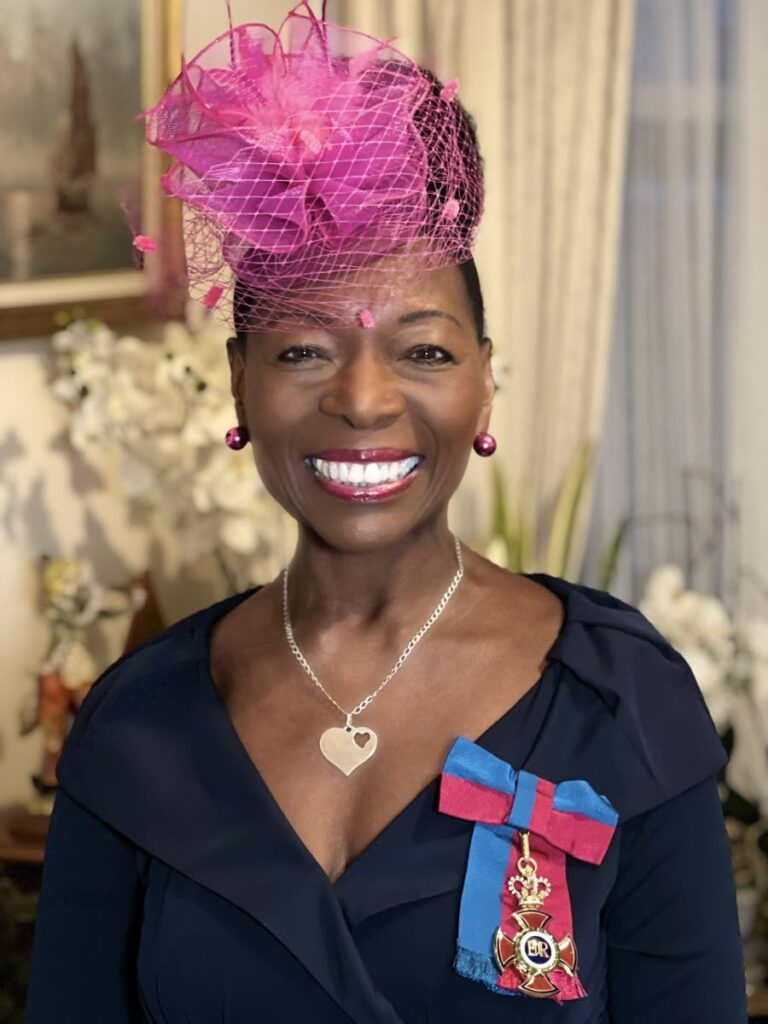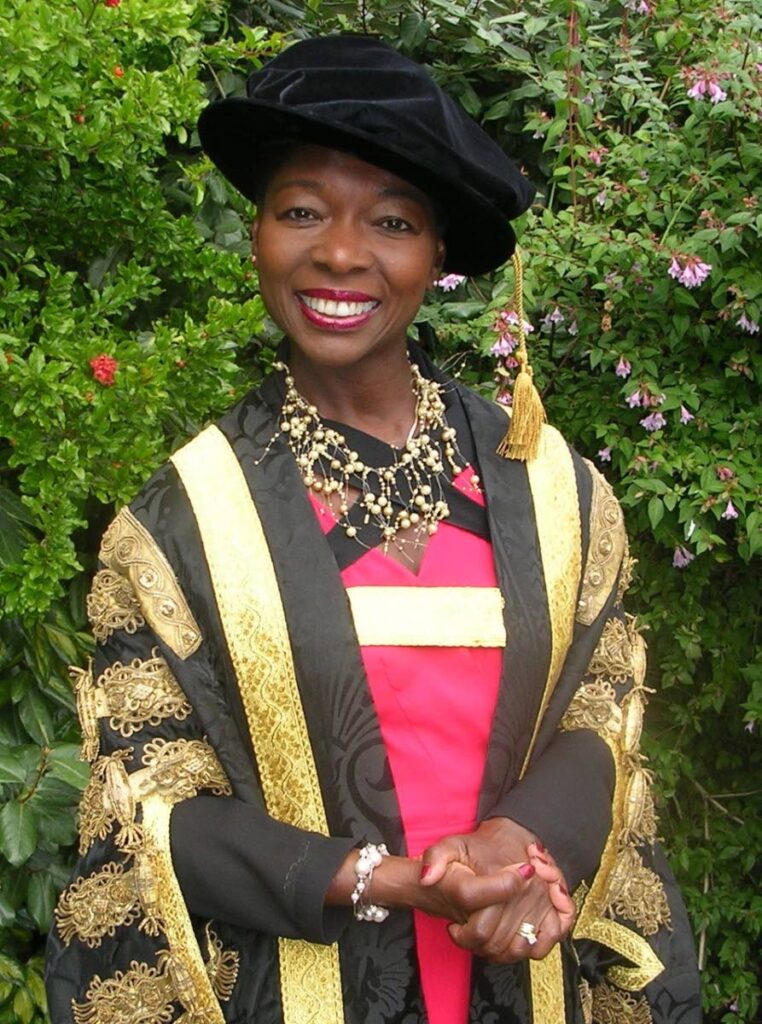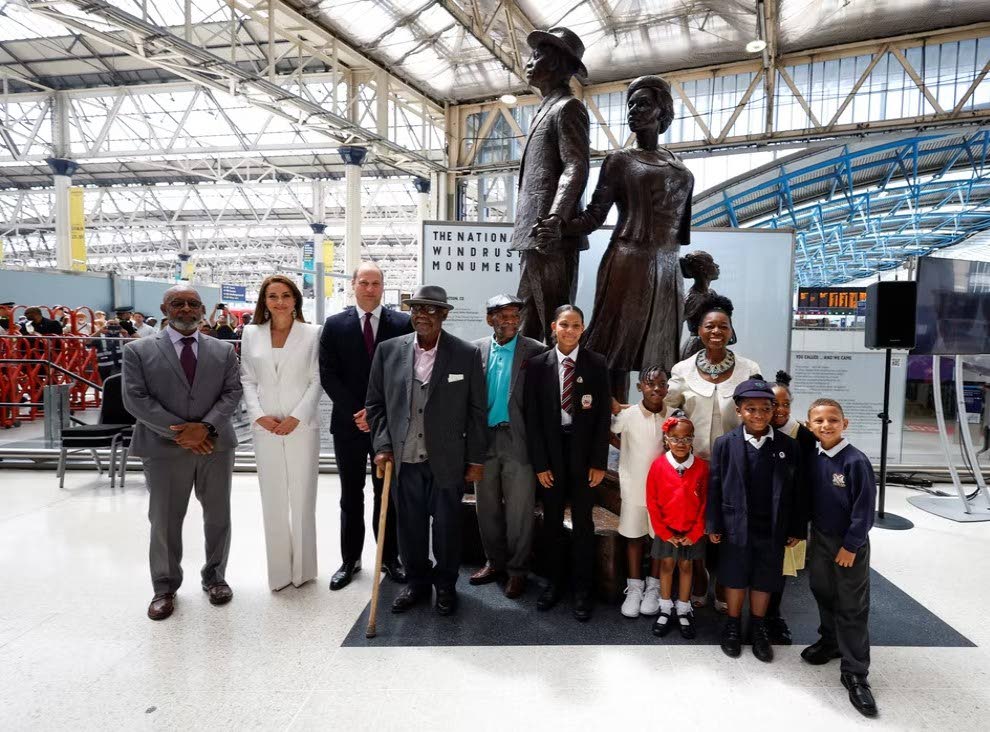Marabella to House of Lords: Floella Benjamin's rise in the UK

Some people believe you can’t get ahead in business, politics, or life without being ruthless or stepping over others to get what you want.
But Baroness Floella Benjamin proves that ideology wrong as, throughout her lifetime, her main purpose has been helping and inspiring others.
Born into what she described as an idyllic life in Marabella, Benjamin jumped over numerous hurdles when she moved to England at age ten to become a broadcaster; author of over 30 books; stage, film, television and voice actress; broadcaster; singer; producer; businesswoman; politician; advocate of children’s rights, Windrush, and diversity; wife, and mother.
Her passion has taken her to great and unexpected heights, the most recent was becoming the first Trinidadian woman to receive one of the UK’s highest honours, the Order of Merit, on November 24, 2022.
This less than two years after receiving a Damehood for over 40 years of charitable work. She was also elevated to the Peerage as Baroness Benjamin of Beckenham in 2010. And in 2001 she was awarded an Order of the British Empire for her contribution to broadcasting and the media.
A few of her numerous appointments include governor of the National Film and TV School, chairman of British Academy Film Awards-Television, governor of the Commonwealth Institute, governor of Dulwich College, president of The Society of Women Writers and Journalists, and she is still the patron of Bowel Cancer UK and chair of The Windrush Commemoration Committee.
In 2006, she became the first black woman chancellor of a UK university, the University of Exeter, and changed the face of universities in Britain. Some were shocked by all her accomplishments as she does not have a university degree.
She told them, “I went to the university of life. I studied empathy and common sense, making everybody feel as if they are special and included, and making them feel worthy.

“My philosophy is to do good. What can I do today to change somebody else's life, to make somebody else feel good about who they are, and to pave the way for the future? You don't have to have an academic education to learn that. That comes in a different guise, from sitting and talking to people, and getting them to realise why they've been put on this earth.”
Journey from TT to UK
Born on September 23, 1949, Benjamin said her childhood was filled with animals, fruits, waterfalls, beaches, freedom, and joy. She said life back then had a sense of purity and wholesomeness.
However, her father, Roy Benjamin, was a policeman who loved playing music and wanted to become a jazz musician. So, he moved to England to learn to play jazz.
When her parents left TT to set up a life in London, they took their two youngest children. Benjamin was the second eldest of six, whose ages ranged from two to nine, so she remained in TT with her three siblings.
They were left with people who mistreated them so, by the time their parents sent for them 15 months later, they were happy to leave, even though they had never before been on a ship or left the country.
When she arrived in 1960 at age ten, she thought they would be welcomed with open arms because, at school, she had sung God Save The Queen and learned about British history and writers. She was taught she was British and felt as if she was part of the motherland.
“So it was quite traumatic, the realisation of what England was truly like – it was cold, it was bleak. It wasn't beautiful and colourful like the houses in Trinidad. The smell was of smoke from the chimneys where would be burning coal. It was a bleak England we came to rather than this glorious empire that we thought we were coming to and being welcomed into.”
The people were also a disappointment.
For example, she said in TT, a person could simply be “a lawyer” but in the UK, they are identified as “a black lawyer.”
“In Trinidad, I knew I was somebody. When you live in England, you are always recognised as a colour. I feel sorry for children who are born in a country like England where they don’t feel their true identity as a person.”
Also, people would say, "Who are you? What are you doing here? Go back to where you come from." They would spit at her, insult her and call her racist names.

Fortunately, her father was “very political.” He told her about Marcus Garvey, Africa, the history of black people in the Caribbean, and Eric Williams and his proposed West Indies Federation. Her sense of history and of self, tempered her feelings of rejection. Still, she and her elder sister would dream up ways of escaping to Trinidad.
She also had a sense of justice and refused to take abuse or insults. She lashed out, and she and her brother Ellington would get into fights almost every day, not just to protect themselves but their siblings as well.
At the age of 14, she had what she called her first spiritual moment. She was fighting a boy for insulting her when she heard a voice.
“I don't know where the voice came from, it might have been my parents voice, maybe the church's voice, whatever it was, but it was a spiritual moment.
“This voice said to me, 'Floella, you can't change the colour of your skin. And if this person has a problem with the colour of your skin, it’s his problem, not yours. Love yourself, the way your mum and dad loves you. Start loving yourself the same way.
“'Prove to the world who you are. It doesn't matter what people think about you as long as you know who you are. That spiritually gives you a sense of worth, that gives you a sense of pride, show the world who you are.'”
She realised no one could tell her she was not worthy. She knew she was not because of the strong feelings of confidence and self-worth instilled by her parents. So she stopped fighting and instead started smiling and fighting with her mind.
She said her mother, Veronica, always told her education was the passport to life, that anything was possible if she worked hard, and no one could take that away from her.
She started appreciating that fact, appreciating her parents, and applying herself in school. She realised she did not need praise and adulation from people because that would allow people to put her down.
“I try and pass this message on to children and to young people, especially women. You don't have to look for approval because you yourself know your limitations, you know whether you've done your best, you know how good you are, and you don't need somebody else to tell you how good you are.”
Benjamin said education is the key to understanding. Even if you disagree with what is being taught, education could put you in a position to change things, as she is now as a member of parliament.
“But if you're not educated in the first place, you don't know how to speak the language, you don't know how to get people to understand what your what your aims are. Now I have ministers coming to me to say, Lady Benjamin, can you help us? Would you advise us about what we need to do? If I wasn't educated, they wouldn't be coming and saying that to me.”
Although she wanted to continue her education, the family’s financial position made that impossible. She left school at age 16 wanting to be a teacher but went to work at a bank and went to night classes to complete her A-Levels.
She thought she would be the first black woman bank manager but after three years she realised that was an impossible dream for a black person, as black people were not allowed to meet the customers or even touch the money.
So when she saw an advertisement for singers and dancers for a show that was running for six months, she went to the audition and got the part. Her mother was not happy about her decision but Roy convinced Veronica to let her have “an adventure.”

She was supposed to return to the bank but she loved the stage too much and stayed in theatre.
At age 27, she became a presenter on Play School, a children’s TV programme that educated children, and realised people do not put children first. She started speaking up for children and campaigning to get a minister for children in parliament since all policies affect children both directly and indirectly.
“How we look after our children decides our destiny, and the consequences of our actions will make a difference to our lives in the years to come. So all my work has been for children. I campaigned for 20 years to get a minister for children, until we finally got one here in Britain in 2003.”
She also realised all the illustrations on Play School were of white children. She asked the producers if they could have children of other races and ethnicities so the children watching at home could see themselves, feel they belong, and celebrate their differences, which is important “as childhood lasts a lifetime.”
This led her to begin the fight for diversity in children’s book and TV screens, she started writing children’s books, the most popular being Coming to England, and working with children’s charities.
Her charity work includes visiting prisons and being a patron for bowel cancer as her mother passed from the disease. And decades of hard work raising money led her to her damehood.
“The whole country rejoiced with me, I think, because they see that I've never neglected my duties of caring for other people. I'm involved with so many different children's charities. I’ve ran ten consecutive London marathons starting at the age of 50 and raised thousands and thousands of pounds for children's charities.”
And while she is proud of all her work, accomplishments, and accolades, the Order of Merit holds a special place in her heart.
Benjamin told Sunday Newsday when it was announced, she received a call from the late Queen Elizabeth’s private secretary. The secretary said two days before she died, the Queen had Benjamin’s autobiography, What Are You Doing Here, which was short-listed for the Parliamentary Book Awards 2022, on her desk. She said Queen read it and enjoyed it and decided to appoint Benjamin the Order of Merit, which King Charles approved after her death.
Now, she and King Charles are working together on a project to celebrate the 75th anniversary of Windrush and have talked about ensuring diversity and inclusion is on everyone’s agenda.
Benjamin was also in charge of installing the National Windrush Monument, which was unveiled by Prince William in June 2022 at Waterloo Station, to celebrate the contribution Caribbean people made to Britain.
“That's why I said to young people never give up. Don't ever feel this is the end. Don't ever try to commit suicide or hurt yourself, because you never know what's coming for you. And little did I know, back then, that I would have this position that I have today of making history, that the monument would be a landmark, that children would be learning about Windrush and Caribbean people.”
Windrush contribution to UK
Benjamin’s most recent political is Windrush because she wants the UK to come together after the Windrush scandal to see that the wrongs need to be righted.
The Joint Council for the Welfare of Immigrants website explains the Windrush generation are people from the Caribbean who went to the UK between 1948 and 1973 to live and work. As the Caribbean was part of the British commonwealth at the time, they were automatically British subjects.
"Because many of the Windrush generation arrived as children on their parents’ passports, and the Home Office destroyed thousands of landing cards and other records, many lacked the documentation to prove their right to remain in the UK.”
They were labelled as illegal immigrants and undocumented migrants, and lost access to housing, healthcare, bank accounts and driver’s licences. Many were placed in detention, prevented from travelling abroad, and deported.
A review, led by Wendy Williams, Inspector of Constabulary and Fire and Rescue Services, was published on March 19, 2020 and the then government agreed to act upon the recommendations therein. However, there were recent newspaper reports claiming the Home Secretary wanted to renege on some of the recommendations.
Benjamin wrote to the Prime Minister asking for the facts but he never replied, even when she and others asked in parliament. She is hoping the government would “see sense” and uphold the recommendations, but the matter was casting a shadow over the Windrush celebrations.
“When you think of what people in the Caribbean have done for Britain, when you think of 400 years ago and what our ancestors had to go through, when you think of the hard work that we in the Caribbean have done to make Britain great, surely we should have more dignity and respect the way we're treated.
“It's an insult if we're not, at least spoken to and told, 'This is not going to be the case,' to be treated with dignity and respect. That's what I'm asking for.”
Despite this upsetting development, Benjamin feels very blessed as the love and support of her family have allowed her to excel.
She said she had the perfect parents, and now the perfect life partner in her husband, agent and manager Keith Taylor. They were married in 1980 and have two children – their son Aston Taylor, 43, who is a lawyer, and daughter Alvina Tylor, 34, who is a geography teacher.

Asked about her future plans, she said she never plans anything. That she wakes up every day and lets the world lead her to what is right for her.
She said every day the phone rings and something happens, which is how she got into formal politics. After speaking at an event about children, her mission and dream for the world, someone from the Liberal Democrat party approached and said she was the type of person they wanted to sit on their benches in the House of Lords.
It seemed apt as her grandfather, Leonard Benjamin, was a deputy prime minister of Antigua and Barbuda, her uncle, councillor Campbell Benjamin, was the former mayor of Bolton in Manchester, her father was political, and she lived with politics in her life.
“At the moment I'm having a very joyful, exciting pleasurable life full of love, joy and contentment. What more can a girl ask for?”


Comments
"Marabella to House of Lords: Floella Benjamin’s rise in the UK"